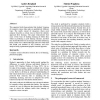Free Online Productivity Tools
i2Speak
i2Symbol
i2OCR
iTex2Img
iWeb2Print
iWeb2Shot
i2Type
iPdf2Split
iPdf2Merge
i2Bopomofo
i2Arabic
i2Style
i2Image
i2PDF
iLatex2Rtf
Sci2ools
ITICSE
2006
ACM
2006
ACM
Students learn CS in different ways: insights from an empirical study
This empirical study demonstrates that students’ learning of computer science takes place in qualitatively different ways. The results consist of categories, where each category describes a certain way in which the students approach their learning. The paper demonstrates that some of the ways of tackling learning do better than others in producing a good learning outcome, and that they should therefore be encouraged. The data underlying these results were collected through interviews with third and fourth year students in two countries, and were analysed using a phenomenographic research approach. Keywords Computer science education research, the act of learning, phenomenography.
Related Content
| Added | 14 Jun 2010 |
| Updated | 14 Jun 2010 |
| Type | Conference |
| Year | 2006 |
| Where | ITICSE |
| Authors | Anders Berglund, Mattias Wiggberg |
Comments (0)

